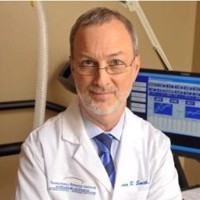AdventHealth Recruits 10,000 Patients For WholeMe DNA Clinical Trial

By Ed Miseta, Chief Editor, Clinical Leader

AdventHealth is a multi-state care network with more than 50 hospitals. In Orlando, it has a research institute comprised of 14 different research departments. The 125 doctors and 250 employees of the research Institute support clinical trials within several therapeutic areas including pediatric, cardiovascular, and oncology. The organization has a portfolio of roughly 500 clinical trials with 50 percent of those studies being in oncology.
In late 2018, AdventHealth funded and developed a new center for genomic health and personalized medicine, led by physician Wes Walker, who is now the director of genomics & personalized health.
“The goal of the center is to accelerate the integration of genetics and genomics into our healthcare system,” says Steven Smith, CSO for AdventHealth. “We had a few specific goals with the first high-level project we opted to undertake. One was to accelerate the education of our community, patients, staff members, and physicians about the power of genomics in medicine.”
A second goal was to integrate and expand the organization’s research portfolio into trial matching for patients participating in precision medicine trials outside the area of oncology. According to Smith, AdventHealth hopes to advance the genetic testing and screening components of its clinical trials enterprise.
A 10,000-Person Sequencing Trial
The first genomics project AdventHealth decided to undertake is called WholeMe. WholeMe is a clinical trial that will sequence the DNA of 10,000 Floridians. The goal of the trial is to better prevent, diagnose, and treat diseases, including hypercholesterolemia, a life-threatening condition that causes high cholesterol.
AdventHealth is partnering with Helix to perform the WholeMe study. Helix is a personal genomics company that will perform the DNA sequencing of trial participants and be a repository for the data.
“We chose to work with helix because they had an outstanding track record with the Healthy Nevada project,” says Smith. “We were impressed with both the quality and scale of the Nevada project, as well as the Helix Next Generation Sequencing (NGS) technology.”
 Steven Smith, CSO, AdventHealth |
According to Smith, some sequencing companies use microarray technology. Helix uses NGS to sequence a proprietary assay called Exome+. That provides 100 times more data than was previously available. Exome+ includes all 22,000 protein-coding genes as well as additional regions known to be of interest. Helix will sequence each participant’s DNA sample once, and then securely store that information so the user can choose to explore many DNA-powered applications throughout their lifetime.
AdventHealth will only be analyzing a fraction of the data collected via the sequencing. The focus will be on a couple of areas that are clinically relevant and are known to lead to the development of disease.
“We perform sequencing within our clinical laboratories and we also sequence within our research laboratories,” states Smith. “But, when you start sequencing exomes at scale, that takes quite a bit of infrastructure. We chose to work with Helix since they already had an established and robust system to do that.”
Open To Almost Everyone
Most trials have strict inclusion and exclusion criteria. For the 10,000 participants in the WholeMe trial, AdventHealth was willing to accept almost any adult patient.
“We recruited any adult 18 or older and located in the central Florida community,” says Dr. Rebecca Essner, data scientist and geneticist at AdventHealth. “All they needed to have was an email address and access to the Helix portal. Participants had to be willing to set up an account with Helix. Through that portal, study participants can receive both clinical results and some ancestry insights and other fundamental traits.”
Of the 10,000 participants, AdventHealth will recruit a small subgroup of 750 people that already had experienced a cardiac event. The trial will attempt to determine if genetic testing and the counseling that comes from that can improve their long-term care and outcomes.
Overcome Privacy Concerns
DNA sequencing is a subject that causes some to be concerned about privacy issues. On that topic, AdventHealth took a very proactive stance. Through a variety of different means, the organization was able to learn from the experiences of other academic medical centers and healthcare systems. AdventHealth also engaged in discussions with external consultants and legal and ethics experts.
“We studied this issue extensively,” says Essner. “We did not just jump in and decide to perform DNA sequencing. Privacy concerns were front and center of every discussion we had prior to committing to this project and recruiting patients. We wanted to ensure we were educating both staff and participants on data integrity, storage, privacy, and access. We also reinforced that fact that participants had the ability to withdraw their consent at any time and request that their genetic data be anonymized or destroyed.”
Additionally, Smith stresses that there are best practices that exist around the topic of DNA sequencing. There are legal and ethical ways of performing sequencing that protect both the patient and the company doing the testing.
“Jumping in a pool with no water is never a smart idea,” he quips. “We performed a lot of research and had many conversations to make sure there was plenty of water in the pool before we jumped in. Protecting the privacy of our patients was a central part of our mission. That is a subject we took very seriously.”
eConsent Answers Questions
Essner adds there are strong procedures in place to ensure that data does not leave the electronic systems where it is stored. Additionally, staff is educated on proper data entry procedures to ensure the data is properly safeguarded prior to being entered in the database.
This issue of privacy was also paramount as AdventHealth designed its informed consent system. Essner notes an electronic informed consent system from LifeOmic was used at the sites. When patients arrive, they register and can watch informative videos with background information on the study.
Patients will then read through the informed consent information on a computer. As soon as they sign the eConsent form they are emailed a copy of it. The next step is filling out a variety of different intake surveys that provide basic medical history information. The final step involves rendering a saliva sample.
A Gene Variant Causes Disease
As noted earlier, the primary endpoint of the WholeMe study is to better prevent, diagnose, and treat diseases, including hypercholesterolemia. Familial hypercholesterolemia (FH) is caused by variants or mutations in a group of genes which causes high cholesterol and, therefore, the disease. Those that have the gene variance can be treated in a clinic.
“There are many genes where we know that a variant can cause disease,” says Smith. “This is one that happens to be both common and treatable. That is also a primary reason why we chose to start our efforts in that space. When doing the sequencing, we analyze the FH genes more closely and specifically. When we detect a variant that is related to high cholesterol, we can route the patient into clinical care pathways. This is not a discovery project where we're trying to figure out which genes cause disease. We already know these genes cause disease. We are hoping to identify individuals with those gene variants to prevent the development of FH and cardiovascular disease.”
Essner notes the enrollment process, which began last year, is still underway. Currently WholeMe is at 67 percent of its recruitment goal. AdventHealth personnel have been travelling to different markets across central Florida meeting with a variety of participants. The hope is to recruit a diverse patient population by taking the trial directly to the people.
There is no scheduled end date for the WholeMe study. Follow-up surveys are being conducted with participants to learn what changes have been made to their healthcare as a result of the genetic insights. Once enrollment is complete, follow-up surveys will continue for an additional six months.
“This is really an education for us,” adds Essner. “We are educating ourselves on downstream health care implications of this genetic testing and educating the patient community on the importance of this genetic information. We know there are clinically actionable gene variants that exist in patients. A big part of this study is learning from that information and sharing those learnings with physicians and the general patient community. We are creating clinical pathways so patients can follow-up on results and receive confirmatory blood tests. Participants will also receive genetic counseling sessions and visits with staff cardiologists at Advent Health. The cardiologists will walk them through what their results mean and what the next steps are. We will be here to walk them through their wellness journey.”
